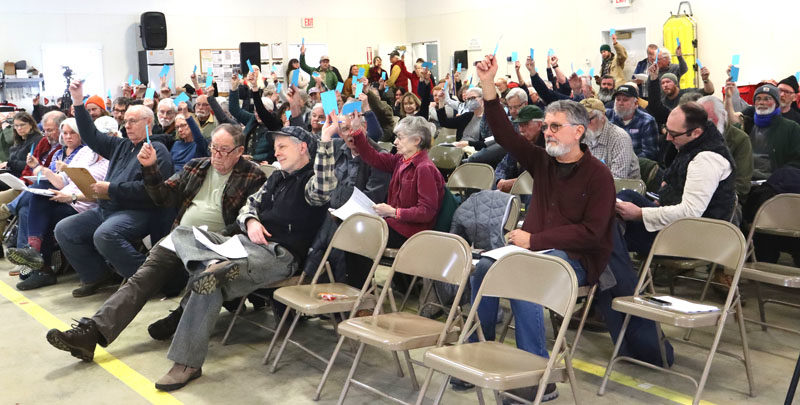
Alna voters raise their cards in approval of appropriating $125,000 to a fire truck reserve account during the town’s annual meeting Saturday, March 29. The balance in the capital reserve account will contribute to the purchase of a $740,000 pumper tanker fire truck, which was also approved by voters at the March 29 town meeting. (Piper Pavelich photo)
Over three hours, Alna residents worked through a 51-article warrant, approving the purchase of a $740,000 pumper-tanker fire truck, the donation of property in the town’s historic Head Tide district, and a $1.3 million municipal budget during the town’s annual meeting on Saturday, March 29.
After a two-hour discussion that filled most of the meeting, voters authorized the town to purchase a 2025 pumper-tanker equipped with a compressed air foam system for the Alna Volunteer Fire Department.
The truck, which cannot exceed the price of $740,000, will replace a pumper-tanker that turns 30 this year, Alna Fire Chief Mike Trask said.
The town will use up to the full amount in the fire truck reserve account, $125,000 raised at the March 29 meeting, and any funds raised at subsequent town meetings together with a loan of approximately $561,643 at a 5.48% interest rate for a term of 10 years to purchase the truck.
The balance in the town’s fire truck reserve account as of Jan. 31 was $213,604.32.
The select board said annual payments will be approximately $74,449.04 and will begin in April 2026.
With many concerned that the town cannot afford a new fire truck, voters discussed possibilities including purchasing a used pumper-tanker truck, refurbishing the town’s current truck, or putting off purchasing a new truck for a couple of years.
“I think the fire department and the town should consider raising more cash every single year and we bring this topic up again when we have enough cash to buy a fire truck,” said resident Jeff Philbrick. “If, in the meantime, Mike (Trask) or others wants to decide to repair our existing fire truck or do something different, then we reconsider it.”
Trask dissuaded the town from these options, stating that delaying the purchase would result in the town seeing an even larger increase in the cost of a truck due to proposed tariffs on stainless steel and aluminum, which the truck’s body is made of.
Also, he said, the town has always purchased a new truck after one has been in service for 30 years, and it will take roughly two years for a new truck to be built.
Although voters didn’t come to a unanimous decision, the majority in attendance ultimately voted to accept the recommendation from the Alna Select Board and Trask to purchase a new pumper-tanker.
To help pay off the cost of a new truck in less than 10 years, some voters said they hope to see the town earn a return on its invested funds, sell the current truck, and raise more than the typical $50,000 a year for the fire truck reserve account.
The town got started on saving up more money shortly after approving the fire truck purchase, increasing the amount of funding to be appropriated to the fire truck reserve account from $50,000 to $125,000, an increase of $75,000 or 150% from last year.
Resident Willard Morgan said he walked into the town meeting uncertain and leaning against approving the purchase of a fire truck. He ended up voting in favor of approving the purchase.
“I was concerned about the total cost. I’m now convinced that there’s a way to do this now,” said Morgan. “I agree with Jeff (Philbrick)’s proposition that we should be paying ahead instead of over time but if we don’t secure something … I’m quite confident we’re going to be spending a lot more on this and we won’t have a choice at some point.”
Trask said the town will pay roughly $137,000 up front for the chassis, or the basic operating equipment within the body of a fire truck, such as the engine, frame, and other structural and mechanical parts. The remaining amount of money will be paid when the body is ready and accepted by the town.
Property donation
Voters also approved a donation of property from the estate of Richard Plunkett, who died in November 2024. Plunkett owned the late 1800s property at 45 Head Tide Road, operating Wizard of Odds and Ends Antiques & Such from 2008 until his death. With approval from voters in hand, select board members are authorized to do with the property as they deem fit, whether that means developing something new for the town or selling it.
“Two years before his death, Richard (Plunkett) initiated a series of conversations with me in which he said he was updating his estate plan,” said resident Ed Pentaleri. “Among the things that he shared with me was his interest in leaving the storefront and the barn to the town of Alna, and how he imagined those buildings being used and preserved for the benefit of the community.”
If it is sold, the town will respect Plunkett’s wishes of donating the funds received from the sale to the Fund to Support Historic Alna, a nonprofit organization with a purpose of preserving, maintaining, and restoring historic sites in the town.
Blasting ordinance adopted
In stark contrast to shooting down a proposed mining and blasting ordinance at last year’s five-hour annual town meeting, voters approved a newly proposed blasting ordinance with no discussion on March 29.
As soon as the vote was on the table, Alna’s Ad Hoc Mining and Blasting Committee moderator Chris Cooper stood up to explain the process the committee went through to put this version of the blasting ordinance in front of voters. The committee formed after the blasting and mining ordinance was rejected last year.
The committee met throughout the past year to develop the amended version of the ordinance, deciding to take up the issue of blasting exclusively to simplify the task, Cooper said. The committee included nonvoting representatives from small pit owners and Topsham-based company Crooker Construction, who has a gravel pit in the town.
The blasting ordinance was created to minimize the potential side effects of blasting, including potential effects of blast shockwaves on local groundwater, wildlife, ecosystems, and the homes and wells of residents, according to the ordinance’s language. It includes permitting requirements and performance standards for different types of blasting.
The version of the ordinance voted down in 2024 would have regulated mining as well as blasting and included sunset provisions on some mining, quarrying, and rock crushing operations, items that are not included in the ordinance approved March 29.
Cooper said the committee started out with a completely split opinion about enacting any kind of mining or blasting ordinance, with half advocating for an ordinance and half not wanting one.
“For 13 weeks, these nine people fought with each other, argued against each other, and, at the 11th hour, under mandate from (the Alna Select Board) to get ‘er done, they did it,” said Cooper. “In the end, four people who didn’t want an ordinance and four people who would prefer a much stricter ordinance agreed. One member said, ‘This is pretty good.’ Another member, who had fought tooth and nail with this guy over the summer and fall said, ‘It’s pretty good.’ So, either it’s not bad, or it’s pretty good.”
Cooper also said it was worth noting that the representative from Crooker Construction said, “We can live with this,” in regard to the blasting ordinance.
Following voter approval of the ordinance, audience members broke out in applause.
Budget articles
Many of the articles voters approved make up the town’s municipal budget, which totals $1,335,572, an increase of $134,046 or 11.15% from last year.
The increase includes accounts that have not been funded by taxpayers in previous years due to surplus, Alna First Selectperson Nicholas Johnston said, citing the cemetery, general assistance, and planning board administration accounts.
The cemetery account budget totals $10,000, general assistance is $5,000, and planning board administration is $2,000.
Also, voters added $75,000 to the proposed $50,000 budget for the fire truck reserve account.
No change is expected for the town’s snow removal contract and associated expenses, which is $325,000. Alna’s three-year contract with Michael Jewett, of Whitefield, ends in June 2026.
The budget for town official salaries and stipends is $151,945, an increase of $3,500 or 2.36%. The rise is mainly due to a $3,000 increase in the deputy town clerk and tax collector salary.
The Alna Volunteer Fire Department budget is $128,538, up $4,376 or 3.52%. Increases in department administration costs, pay for on call firefighters, and insurance contribute to the overall budget increase.

Alna Planning Board Chair Cathy Johnson hands a gift of appreciation to fellow planning board member Peter Tischbein during Alna’s annual town meeting on Saturday, March 29. With over three decades on the planning board under his belt, Tischbein is retiring from public service. (Piper Pavelich photo)
No changes are anticipated for the general highway maintenance account budget or the solid waste contract budget, which both total $125,000. Alna contracts with the Wiscasset Transfer Station for solid waste disposal.
The administration account budget is $55,000, which is down $10,000 or 15.38% due to the line for legal fees moving to a legal services cost center.
The ambulance service budget totals $30,000, an increase of $3,000 or 11.11%. The town of Alna contracts with Wiscasset Ambulance Service.
The tax assessment, commitment, and associated expenses budget is $25,250, up $7,000 or 38.36%. This budget includes expenses associated with the town’s annual valuation update, tax maps, and databases.
The legal services budget is $20,000, which is up $12,000 or 150% due to the town’s increased need for legal services last year.
The social security, Medicare, and Family Medical Leave Act budget is $17,000, a rise of $4,000 or 30.77% from last year. This increase is due to the implementation of Maine’s Paid Family Medical Leave Act.
In 2023, Gov. Janet Mills signed the creation of a paid family and medical leave program, making Maine the 13th state to establish one, according to maine.gov.
Beginning in 2026, eligible workers will have up to 12 weeks of paid time off available for circumstances such as caring for a family member with a serious illness or to care for their own medical needs. Employers and employees share the cost of the benefit through payroll taxes, which became effective on Jan. 1.
The Cross Road repaving loan totals $48,560 and the property tax revaluation reserve is $24,000.
This is the second year the town is asked to appropriate $24,000. A property revaluation will cost about $70,000 and is expected to be completed in 2026, said Johnston.
Voters also enacted a new floodplain management ordinance, which replaces the town’s floodplain management ordinance that was amended in March 2024.
While the ordinance was compliant with federal law, some required changes had not been incorporated by the town. Significant changes to the ordinance include the adoption of a local floodplain administrator, which will be the Alna Planning Board, and revisions to development standards.
Amendments to the town’s appeals board ordinance were also approved by voters, which include the correction of minor typographical errors, bring the ordinance to current Maine Municipal Association standards and language terms, and removing the $25 application fee for a hearing.
In the town’s municipal election on Friday, March 28, incumbent Steven Graham was chosen over challenger Ed Pentaleri to serve a two-year term on the Alna Select Board. (See related story in this edition)
Incumbent Coreysha Stone was reelected for a two-year term in the third seat on the select board. Sherry Lyons was chosen to serve a three-year term on the RSU 12 Board of Directors.
Trask was reelected for a one-year term as the town’s road commissioner.






